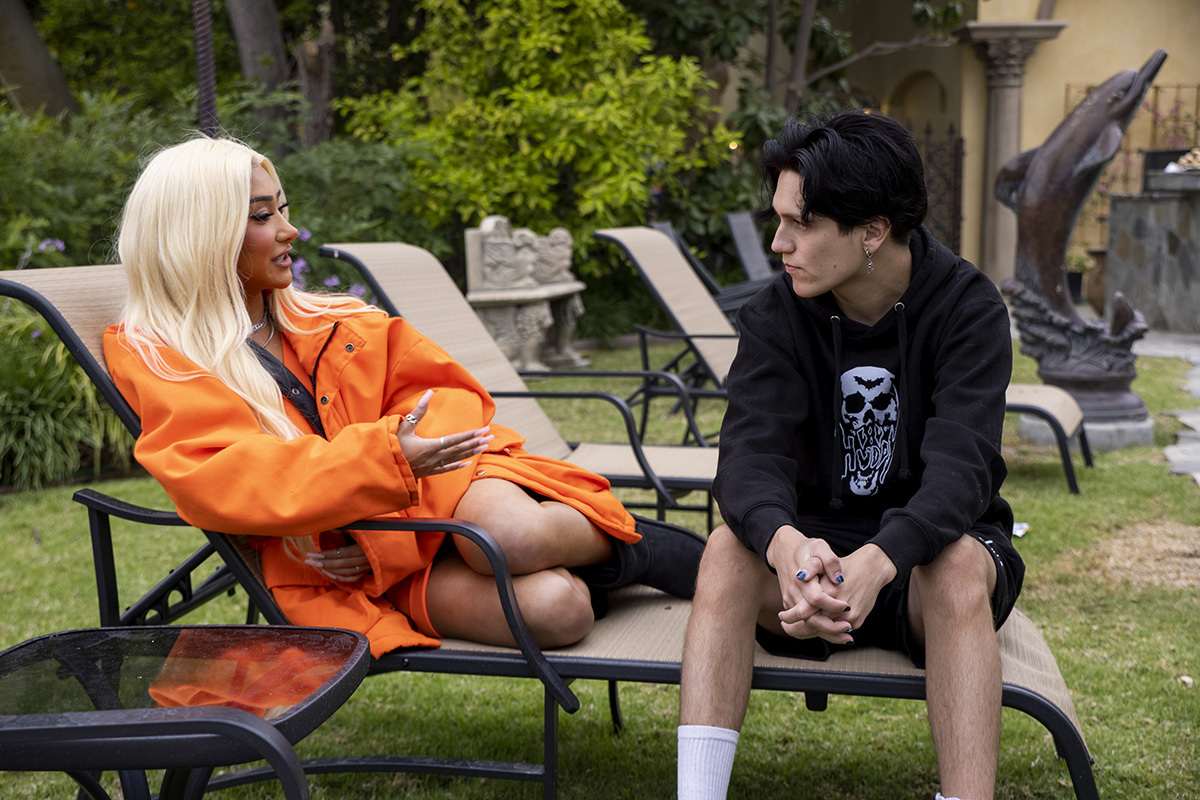TV review: Netflix’s new reality show ‘Hype House’ fails to live up to hype

Nikita Dragun (left) and Chase Hudson (right) in “Hype House.” (Courtesy of Netflix)
"Hype House"
Netflix
Jan. 7
By Allyson Weissman
Jan. 7, 2022 3:42 p.m.
Despite its name, the Hype House fails to reclaim its hype in its new Netflix reality series.
Released Friday, “Hype House” follows a TikTok content house founded by Thomas Petrou, Chase Hudson, better known as Lil Huddy, and Alex Warren as they pursue their latest personal and professional endeavors. However, since its peak, the Hype House lost many of its high-profile members and also moved out of its Hollywood mansion, making the announcement of its reality show a downer for many. When Netflix released its promotional material on TikTok, millions of users took to their phones to bash the show before it even came out. And the TikTok community’s predictions were true – the show is underwhelming.
The series begins with a visual tour of Hudson’s new house, which is not the main Hype House now located in Moorpark. The episode begins with his narrative of moving out to focus on music. But opening with someone who wants to break away from the house counters the supposed purpose of illustrating the success of the Hype House. Beginning with Hudson also sets a dull tone, as his confessionals lack the big energy and personality normally associated with entertaining reality television.
[Related: Film review: Love isn’t a low score in Venus and Serena Williams’ ‘King Richard’]
Though many of the Hype House members have similarly dreary personalities, Nikita Dragun’s confidence and ability to stir the pot as well as Larray’s outgoing and lovable persona thankfully add an entertaining factor to the mundaneness. Observing the complex dynamic between the two is a bit more captivating than the other plots, as the pair squabble over Larray’s team blaming Dragun for his irresponsibility after testing positive for COVID-19, resulting in production being shut down. This conflict had the potential for engrossing drama, but the plot’s background feels rushed with its choppy transition and lack of footage or other visuals to help communicate the premise of the story.
And although Dragun and Larray are the most compelling to watch on screen, they do not live in the main Hype House. This is a fundamental problem with the reality series, as it is meant to showcase the lives of the people in the house, yet tends to focus too much on those who are no longer associated with the house, like Charli D’Amelio. In one scene, Hudson invites a few friends, including D’Amelio, to a dinner party, in which Larray reveals in his confessional that he is concerned about D’Amelio being used as a “clout toy.” Yet that is exactly what the show itself does – because the current members of the Hype House no longer have any relevance, they constantly name-drop and display D’Amelio to build the house’s credibility.
Like the Hype House, the D’Amelio family also recently released a Hulu reality series with the same purpose: to present a personalized view of the influencers behind the TikToks and headlines. But unlike “Hype House,” the D’Amelios were able to transform their unfavorable reputations and become relatable to the average viewer by exhibiting vulnerable moments and their mental health struggles involving toxic social media culture. Contrarily, when discussing the implications of cancel culture, the Hype House members come off as superficial as they talk in business terms rather than the emotional, eliminating the sympathetic reaction they aimed for.
Adding to the frivolity, the main conflict presented throughout the show is Petrou’s frustration with the members’ lack of effort and infrequent posts. Though this helps give insight into the business aspect of TikTok, the conflict is stretched throughout all eight episodes. The show inserts dramatic and somber music around the discussion in order to portray Petrou as a victim, but instead, it characterizes him as irritable and entitled.
[Related: TV review: 3rd season of ‘You’ brings fresh plot lines but falls short of potential]
Unlike their peers, Warren‘s and Vinnie Hacker’s story arcs are the most authentic out of those who actually live in the house. Warren’s emotional breakdown when visiting his father’s grave is heartfelt as he unveils his rough upbringing and how his father inspired him to make vlogs. Additionally, Hacker’s storyline is relatable as his confessionals are genuine when he describes the challenges of swiftly transitioning from an average kid to a TikTok heartthrob, such as the hesitancy to date due to fear of his superfans ambushing his romantic interests.
Consisting of young influencers with intriguing backgrounds, “Hype House” had the potential to showcase a genuine and new side to TikTok culture, yet it instead reinforces negative stereotypes associated with the platform’s creators. Though the show is meant to humanize the faces seen on thousands of For You Pages, the influencers mostly discuss social media followers and money. Admirable reality television has a cast willing to share every emotion and thought on their mind, but the members of the Hype House seem fearful and reluctant to open up to the camera – except in a few instances – creating an uneventful and lifeless series.
Not even Netflix can revive the hype.


